-- and --
Composer T. J. Anderson
A Conversation with Bruce Duffie
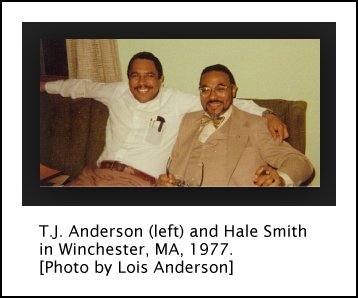

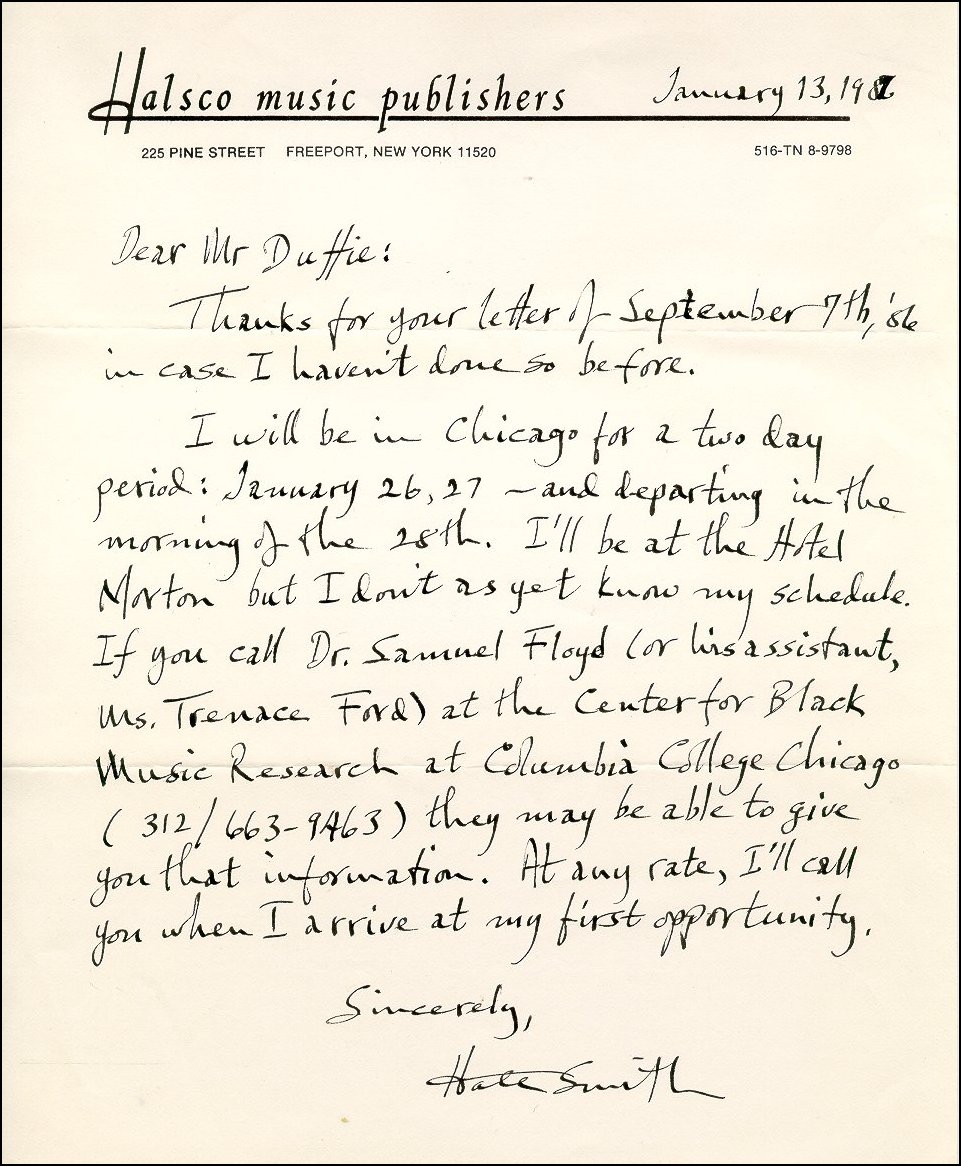
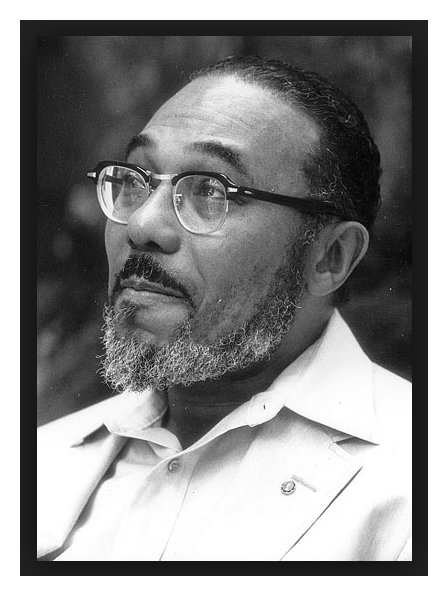 HALE SMITH is regarded as one of America's finest composers. He also had
a distinguished career as an arranger, editor, and educator. Born in Cleveland,
Ohio on June 29, 1925, he began study of the piano at age seven, and his
initial performance experience included both classical and jazz music. After
military service (1943-45), he entered the Cleveland Institute of Music as
a composition major, receiving a bachelor's degree in 1950 and a master's
degree in 1952. His principal teachers were Ward Lewis in theory, and Marcel Dick, his only teacher
of composition.
HALE SMITH is regarded as one of America's finest composers. He also had
a distinguished career as an arranger, editor, and educator. Born in Cleveland,
Ohio on June 29, 1925, he began study of the piano at age seven, and his
initial performance experience included both classical and jazz music. After
military service (1943-45), he entered the Cleveland Institute of Music as
a composition major, receiving a bachelor's degree in 1950 and a master's
degree in 1952. His principal teachers were Ward Lewis in theory, and Marcel Dick, his only teacher
of composition.He moved to New York in 1958 and from that time he worked with many prominent jazz artists, including Chico Hamilton, Dizzy Gillespie, Eric Dolphy, Randy Weston, Melba Liston, Ahmad Jamal, and Oliver Nelson. He also served as an editor and consultant with several music publishers (E.B. Marks, C.F. Peters, Frank Music Corp. and Sam Fox Music Publishers). In 1952, Smith was a winner of the first Student Composer's Award sponsored by Broadcast Music Inc., and in 1960 was commissioned by BMI to compose Contours for Orchestra. His other works include Ritual and Incantation, Innerflexions, By Yearning and By Beautiful, Music for Harp and Orchestra, Orchestral Set, Mediations in Passage, several chamber music and solo pieces and several works for chorus and solo voice and piano. Smith received several honors including the Cleveland Arts Prize, and Awards from the American Academy and Institute of Arts and Letters, The National Black Music Caucus, and an honorary doctorate from the Cleveland Institute of Music. He taught at C.W. Post College (Long Island) and was Professor Emeritus from the University of Connecticut. In addition, he served on the boards of several organizations including The American Composers Alliance, Composer's Recordings, Inc., The American Music Center, and several state arts councils. He also was a copyright infringement consultant, and orchestrator and artistic consultant for the Black Music Repertory Ensemble of the Center for Black Music Research Columbia College Chicago. Smith was appointed to the New York State Council on the Arts (1993-1997) by Governor Mario Cuomo. Smith died after a long illness on November 24, 2009. -- Names which are links on this
webpage refer to my Interviews elsewhere on this website. BD
|
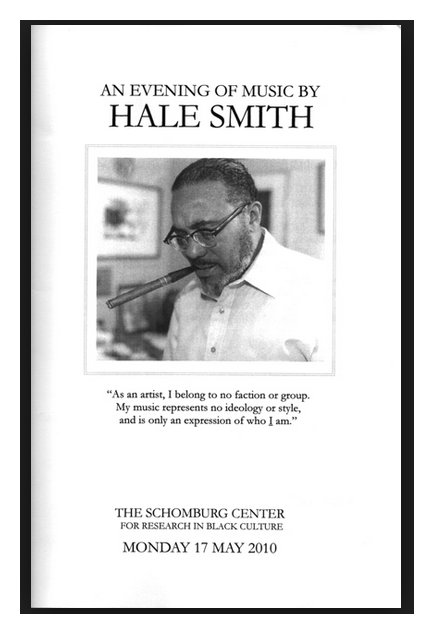 Bruce Duffie: I wrote to Barbara with a list of requests,
so I was the one who came up with your name. I had read about you
in Baker’s Biographical Dictionary [edited by
Nicolas Slonimsky],
and had played a couple of your recordings on the air.
Bruce Duffie: I wrote to Barbara with a list of requests,
so I was the one who came up with your name. I had read about you
in Baker’s Biographical Dictionary [edited by
Nicolas Slonimsky],
and had played a couple of your recordings on the air.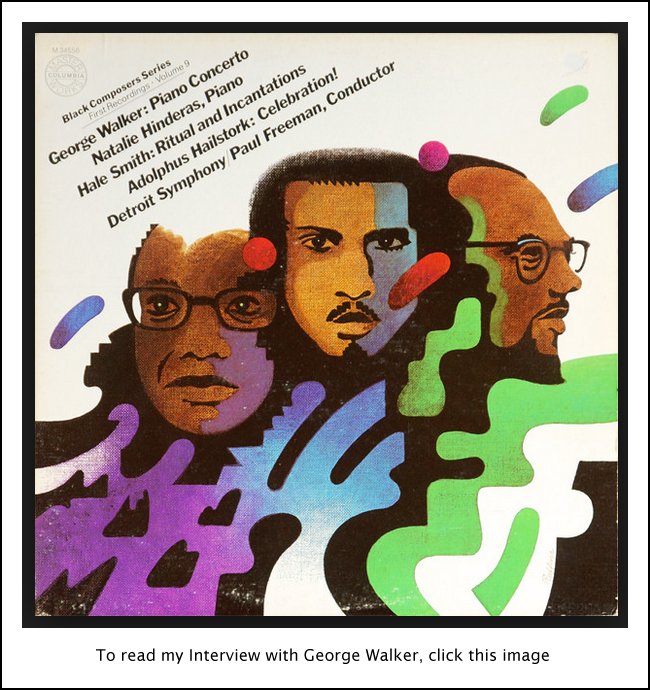 HS:
I don’t think it’s improved. In fact, if anything, education has declined
and musical education has declined. The problem is that there’s too
many teachers who go through school, say from elementary and high school
through college and get into graduate work without ever getting out into
the world itself. They never have a chance of dealing with the application
and these ideas, what I call the real world. It’s all about academia.
Too many of these students become accustomed to having material handed to
them on a platter. They don’t learn to think. They don’t even
know what thinking is these days. The name ‘education’
as it’s used today is a misnomer, because all we’re doing is some sort of
very extended half-way job training course.
HS:
I don’t think it’s improved. In fact, if anything, education has declined
and musical education has declined. The problem is that there’s too
many teachers who go through school, say from elementary and high school
through college and get into graduate work without ever getting out into
the world itself. They never have a chance of dealing with the application
and these ideas, what I call the real world. It’s all about academia.
Too many of these students become accustomed to having material handed to
them on a platter. They don’t learn to think. They don’t even
know what thinking is these days. The name ‘education’
as it’s used today is a misnomer, because all we’re doing is some sort of
very extended half-way job training course.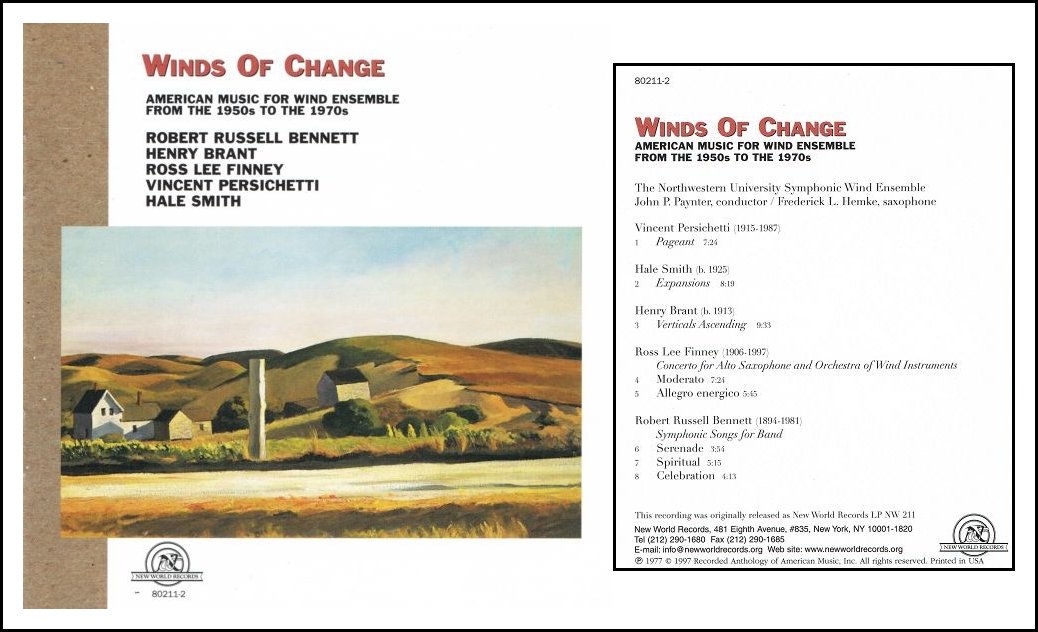
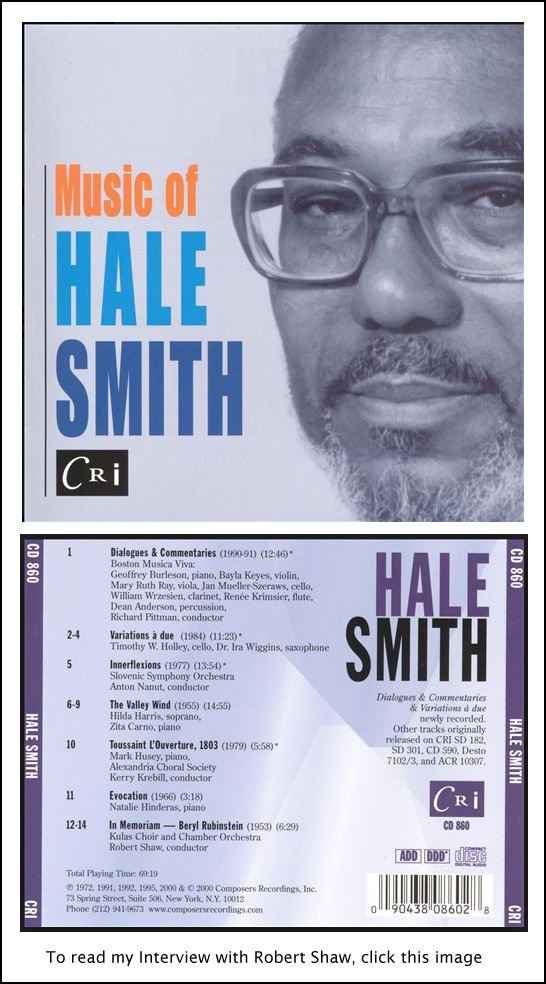 BD: Have you basically been pleased with the
performances you’ve heard of your music?
BD: Have you basically been pleased with the
performances you’ve heard of your music?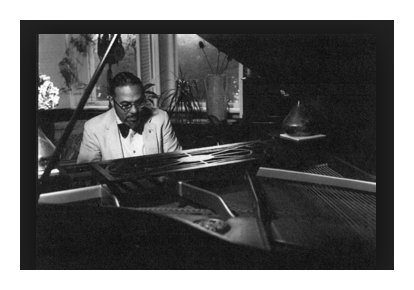 BD:
How do you know when a piece is finished, when you’ve got to quit tinkering
with it, when everything is just right?
BD:
How do you know when a piece is finished, when you’ve got to quit tinkering
with it, when everything is just right?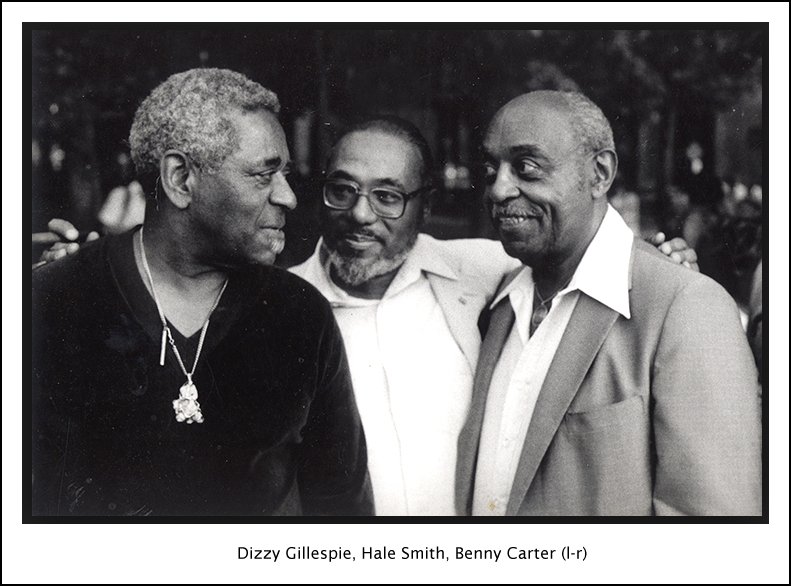
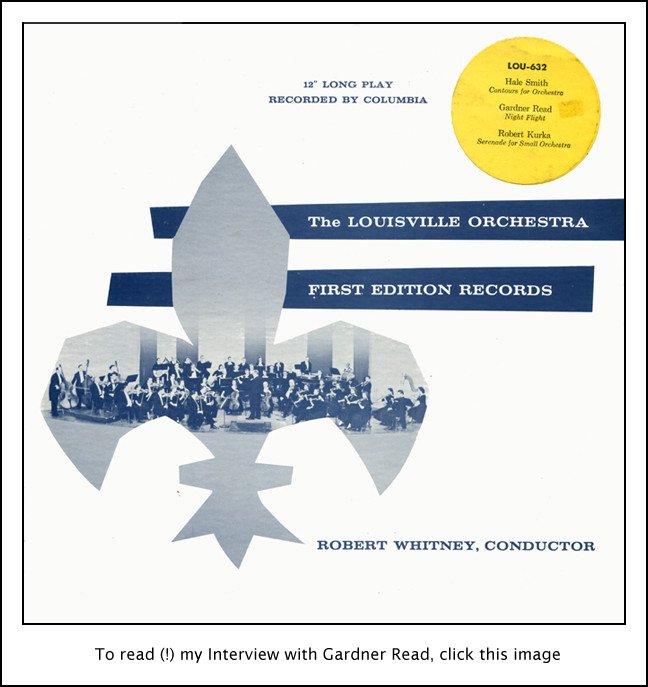 HS: The one thing I’m not pleased about is
that over the years there’s been so few, and there have been none for quite
a while now. Those are other considerations, but in terms of performance
there’s nothing that I would really turn my back on. Even though the
Louisville recording of my Contours for
Orchestra helped to make my name something that at least people interested
in American music would have reason to pay attention to is done in a sincere
way. It has that type of sincerity that I mentioned before, but I’ve
heard performances of it that have a great deal more fire. That particular
piece calls for that type of drama. The recording of the Ritual and Incantation done by Paul Freeman
with the Detroit Symphony was damaged by decisions made on the recording
side, tying in certain sections on the same microphone lines for the balances
and so on. So when we got into the mixing studio, certain adjustments
couldn’t be made without damaging some other section that was on that same
line. I understand this record is coming out on CD, and in fact that
whole Black Composers Series from CBS is coming back on CD.
HS: The one thing I’m not pleased about is
that over the years there’s been so few, and there have been none for quite
a while now. Those are other considerations, but in terms of performance
there’s nothing that I would really turn my back on. Even though the
Louisville recording of my Contours for
Orchestra helped to make my name something that at least people interested
in American music would have reason to pay attention to is done in a sincere
way. It has that type of sincerity that I mentioned before, but I’ve
heard performances of it that have a great deal more fire. That particular
piece calls for that type of drama. The recording of the Ritual and Incantation done by Paul Freeman
with the Detroit Symphony was damaged by decisions made on the recording
side, tying in certain sections on the same microphone lines for the balances
and so on. So when we got into the mixing studio, certain adjustments
couldn’t be made without damaging some other section that was on that same
line. I understand this record is coming out on CD, and in fact that
whole Black Composers Series from CBS is coming back on CD.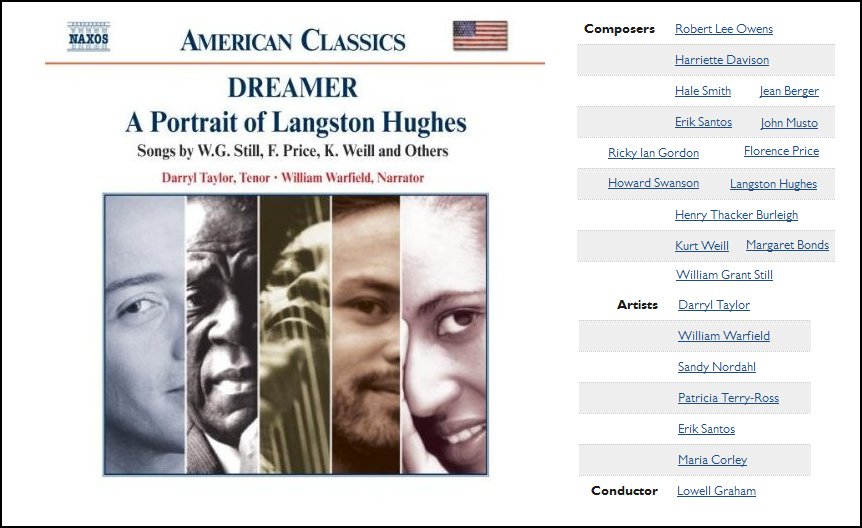
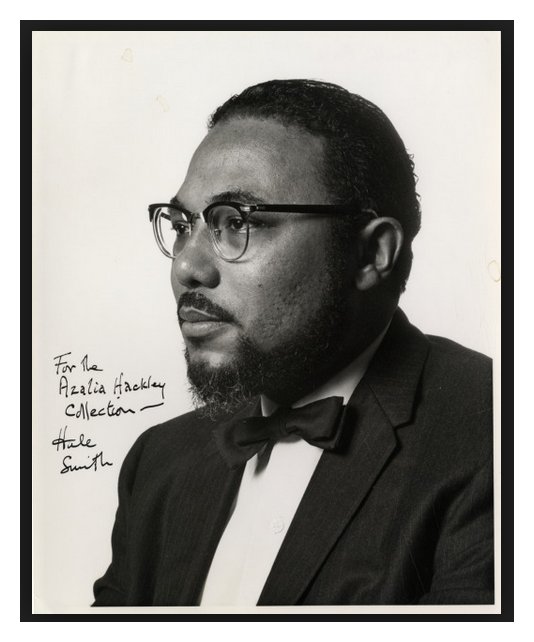 HS: I want to very much, so I’m thinking about
them. Right now I’m trying to sort the two. They are so far apart
that it’s possible I might even pull a Ravel coup and start writing two operas
at one time! [Much laughter] Both of them, for whatever it’s worth,
deal with essentially black subject matter, but they transcend those ideas,
those conditions. One has very rich and beautiful imagery, and the
other is quite stark.
HS: I want to very much, so I’m thinking about
them. Right now I’m trying to sort the two. They are so far apart
that it’s possible I might even pull a Ravel coup and start writing two operas
at one time! [Much laughter] Both of them, for whatever it’s worth,
deal with essentially black subject matter, but they transcend those ideas,
those conditions. One has very rich and beautiful imagery, and the
other is quite stark.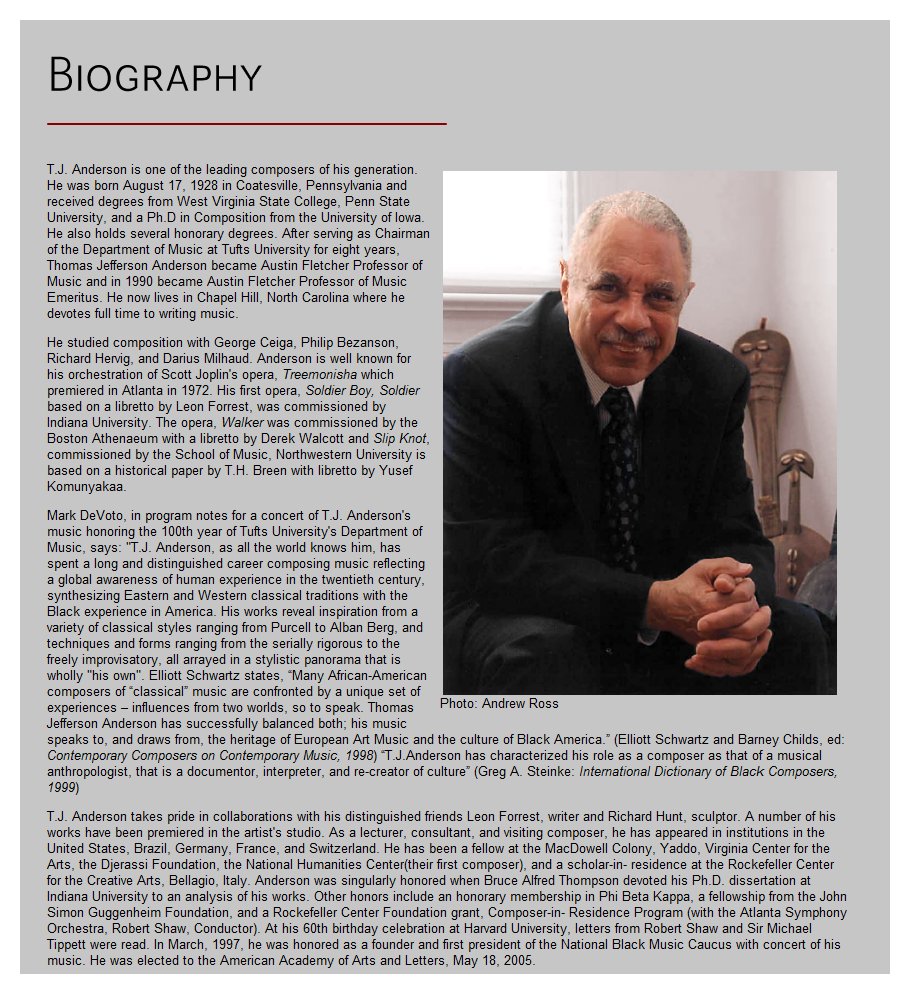
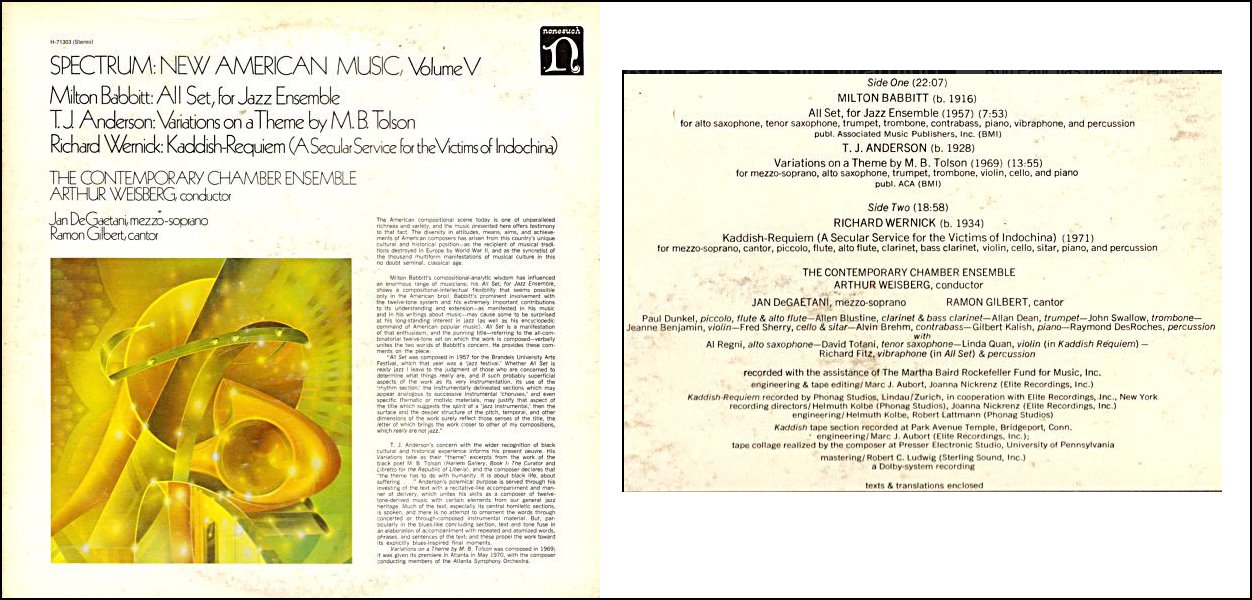
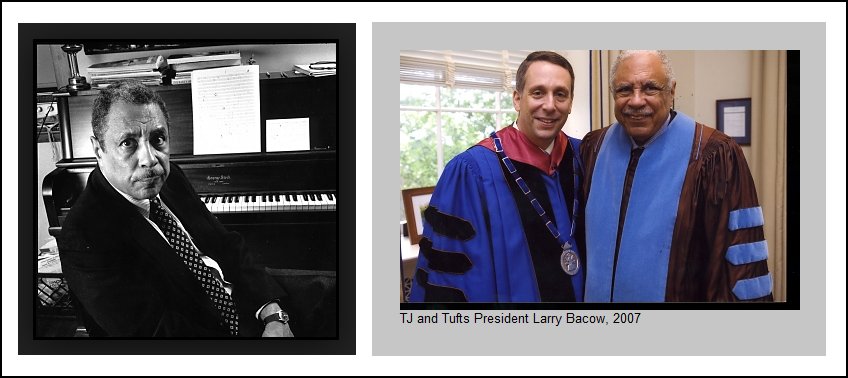
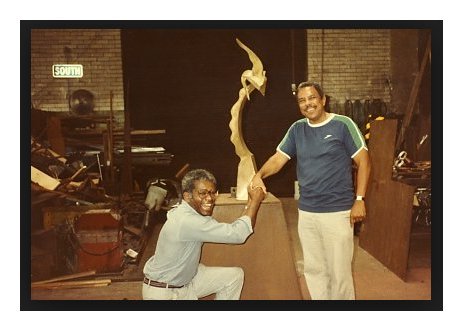 TJA: Yes, a few recordings. I don’t have
as many as Hale, but certainly I have a few recordings. It’s interesting
being back in Chicago because I have very fondest feelings for Chicago.
Particularly, one of my closest friends, the sculptor, Richard Hunt (shown together in the photo at right),
has been very instrumental in my career. I had a fiftieth birthday
celebrated there in the studio, which he made possible. Another thing
is that he commissioned a piece for principal bass of the Chicago Symphony,
Joseph Guastafeste. This was a piece for flute
and double bass [Bridging and Branching]
which I composed for him, and that’s been published by my publisher in Berlin.
Another thing is that my librettist for my opera, Soldier Boy, Soldier, teaches at Northwestern.
This is Leonne Forrest, who I consider one of the most important writers
in America today. His is a tremendous mind, really.
TJA: Yes, a few recordings. I don’t have
as many as Hale, but certainly I have a few recordings. It’s interesting
being back in Chicago because I have very fondest feelings for Chicago.
Particularly, one of my closest friends, the sculptor, Richard Hunt (shown together in the photo at right),
has been very instrumental in my career. I had a fiftieth birthday
celebrated there in the studio, which he made possible. Another thing
is that he commissioned a piece for principal bass of the Chicago Symphony,
Joseph Guastafeste. This was a piece for flute
and double bass [Bridging and Branching]
which I composed for him, and that’s been published by my publisher in Berlin.
Another thing is that my librettist for my opera, Soldier Boy, Soldier, teaches at Northwestern.
This is Leonne Forrest, who I consider one of the most important writers
in America today. His is a tremendous mind, really.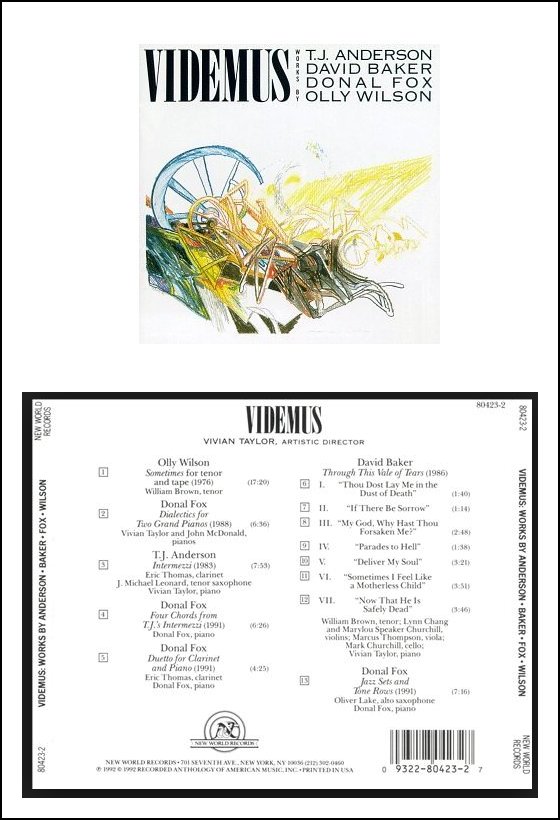 TJA:
No. Obviously there is a style that is somewhat consistent, and there’s
a book on what I do. Like Hale, I have developed a system of writing,
and there’s a dissertation by Bruce Alfred Thomson at the University of
Indiana on my system of how I write. What I try to do is have each
work have a life of its own so it’ll address the particular need of that
work, so that the Vietnam situation doesn’t impact on other things that
I do, only tangentially. I’m doing a piece based on a text by Philip
Levine. I think it’s phenomenal, and it’s about the immigrants that
came to this country and their experiences. When you stop to think,
our great cities were built by immigrants — Chicago,
New York, Philadelphia, Houston. You had this great migration of poor
people coming in, and they were really able to provide an industrial base
for the country. Now most of these people are up in age. They
can’t walk the streets of the city. They’re no longer desired because
the new technology has come in, and their children are no longer desired,
either. Look at the steel industry as an example. It is not
that you object to technology; what you object to is the inhumane relationship
to the technology for the people that made this technology possible in the
first place. What really hits me and disturbs me is when you see high
unemployment rates and would want to be capricious and callous and say that
they’re lazy and don’t want to work, as opposed to trying to be creative and
find a solution to the problem. This is something I think all of us
have as a nation, I think.
TJA:
No. Obviously there is a style that is somewhat consistent, and there’s
a book on what I do. Like Hale, I have developed a system of writing,
and there’s a dissertation by Bruce Alfred Thomson at the University of
Indiana on my system of how I write. What I try to do is have each
work have a life of its own so it’ll address the particular need of that
work, so that the Vietnam situation doesn’t impact on other things that
I do, only tangentially. I’m doing a piece based on a text by Philip
Levine. I think it’s phenomenal, and it’s about the immigrants that
came to this country and their experiences. When you stop to think,
our great cities were built by immigrants — Chicago,
New York, Philadelphia, Houston. You had this great migration of poor
people coming in, and they were really able to provide an industrial base
for the country. Now most of these people are up in age. They
can’t walk the streets of the city. They’re no longer desired because
the new technology has come in, and their children are no longer desired,
either. Look at the steel industry as an example. It is not
that you object to technology; what you object to is the inhumane relationship
to the technology for the people that made this technology possible in the
first place. What really hits me and disturbs me is when you see high
unemployment rates and would want to be capricious and callous and say that
they’re lazy and don’t want to work, as opposed to trying to be creative and
find a solution to the problem. This is something I think all of us
have as a nation, I think.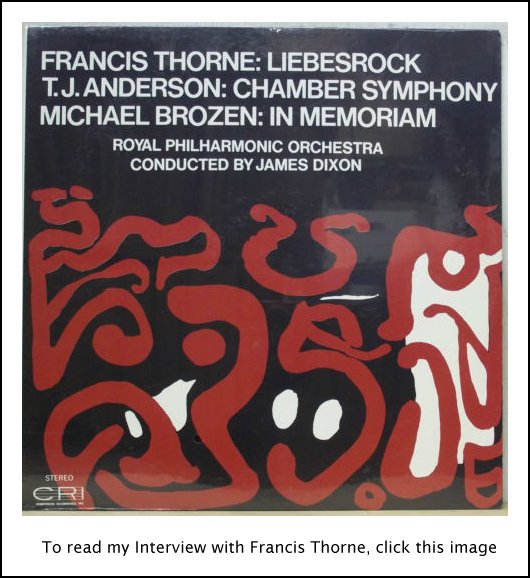 TJA: I’m always optimistic! We go through
our peaks and valleys like all societies, but I’m optimistic. We have
just gotten past the ‘me generation’. Tufts is very much a leader
school, and very expensive. When students come in, it’s almost a joke
because when you ask freshmen what they want, the answer is, “I
want an MBA from Harvard!” or, “I
want to finish medical school.” Their whole career
has been mapped out.
TJA: I’m always optimistic! We go through
our peaks and valleys like all societies, but I’m optimistic. We have
just gotten past the ‘me generation’. Tufts is very much a leader
school, and very expensive. When students come in, it’s almost a joke
because when you ask freshmen what they want, the answer is, “I
want an MBA from Harvard!” or, “I
want to finish medical school.” Their whole career
has been mapped out.
© 1987 Bruce Duffie
This conversation was recorded in Chicago on January 26, 1987. Portions involving Hale Smith were broadcast on WNIB the following year, and again in 1989, 1990, 1995, and 2000; on WNUR in 2012; and on Contemporary Classical Internet Radio in 2012. Portions involving T.J. Anderson were broadcast on WNIB in 1988, 1990, 1993, and 1998. In all cases, selected recordings of their music was also included. This transcription was made in 2016, and posted on this website at that time. My thanks to British soprano Una Barry for her help in preparing this website presentation.
To see a full list (with links) of interviews which have been transcribed and posted on this website, click here.
Award - winning broadcaster Bruce Duffie was with WNIB, Classical 97 in Chicago from 1975 until its final moment as a classical station in February of 2001. His interviews have also appeared in various magazines and journals since 1980, and he now continues his broadcast series on WNUR-FM, as well as on Contemporary Classical Internet Radio.
You are invited to visit his website for more information about his work, including selected transcripts of other interviews, plus a full list of his guests. He would also like to call your attention to the photos and information about his grandfather, who was a pioneer in the automotive field more than a century ago. You may also send him E-Mail with comments, questions and suggestions.